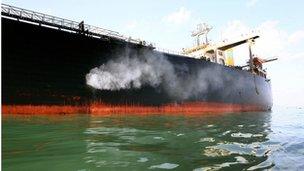Viewpoint: China’s oil tanker economy
- Published

Like an oil tanker, it takes a lot to move China's economy or change direction
China's economy is slowing, and it is slowing fast.
Over the past few weeks, the government has signalled that it is increasingly concerned about both the global and domestic outlook, and it has turned its attention to boosting China's flagging growth.
Until recently, though, policymakers had been fighting tooth and nail to cool things down, not heat things up.
Controlling rampant inflation and a runaway property market have been the government's top priorities through most of 2011, as policymakers grappled with the consequences of the massive monetary stimulus unleashed to yank China out of the global financial crisis.
They ratcheted up administrative measures designed to lock out speculators from the housing sector, aggressively clamped down on the amount of cash that banks lent out and hiked interest rates to signal that they meant business.
And, starting in the summer, the first signs appeared that measures were gaining traction.
Inflation peaked in July and Premier Wen Jiabao made headlines claiming victory over price rises.
Growth slowed further in the third quarter of the year, with more recent monthly output data showing an entrenched downward trend. The froth in the property market finally started to dissipate.
Eurozone risk
But just as the government over-loosened in response to the global slowdown three years' ago, they have over-tightened in response to the inflationary consequences of that no-holds-barred credit expansion.
Stemming a lot of the lending that went on outside the banking system brought things to a head in the third quarter, and the slowdown intensified.

In July Chinese Premier Wen Jiabao declared that the government had stemmed rising prices
In October, 34 of the 70 cities tracked by the statistical authority saw a drop in property prices from the month before.
Output growth from China's industrial sector is now about two percentage points lower than in the summer and electricity production is seven percentage points down.
November's purchasing managers' index - a measure of manufacturing sector sentiment - hit a low not seen since the zenith of the financial crisis.
To compound matters, China's largest export market is in a perilous state.
Indeed, in spite of all the policy challenges domestically, it is the eurozone that constitutes China's largest risk to growth through next year.
Change in policy
With the slowdown now set in motion and the global outlook bleak, China's leaders have switched stance, with policy focused on supporting growth.
"Fine-tuning" measures were first targeted at helping small and medium sized enterprises that had borne the brunt of 2011's credit tightening, and angled towards reviving a government-sponsored programme of affordable housing construction that had struggled to get off the ground.
It was the recent announcement that the government was lowering the amount of cash that banks are forced to lock away at the central bank, though, that signalled a real shift to monetary loosening.
With more capital at their disposal, banks should start to increase lending.
Over the next six months, the government will gradually continue to free up money for the banks, buoying economic activity.
In fact, China could be moving faster in easing credit constraints, given evidence that capital is fleeing the country.
As in most emerging markets, China's leaders are looking for that Goldilocks temperature - an economy not too hot and not too cold.
The problem is that with current policy tools, the Chinese economy is as unwieldy as an oil tanker.
It takes an awful lot to get it to change direction, but once it starts moving, it takes an awful lot to change course.
Policymakers in Beijing are desperately trying to figure out how to prevent growth stalling without pushing the economy into yet another inflationary cycle.
Alistair Thornton is a Beijing-based economist at IHS Global Insight. The opinions expressed are those of the author and are not held by the BBC unless specifically stated. The material is for general information only and does not constitute investment, tax, legal or other form of advice. You should not rely on this information to make (or refrain from making) any decisions. Links to external sites are for information only and do not constitute endorsement. Always obtain independent, professional advice for your own particular situation.
- Published1 December 2011
- Published28 November 2011